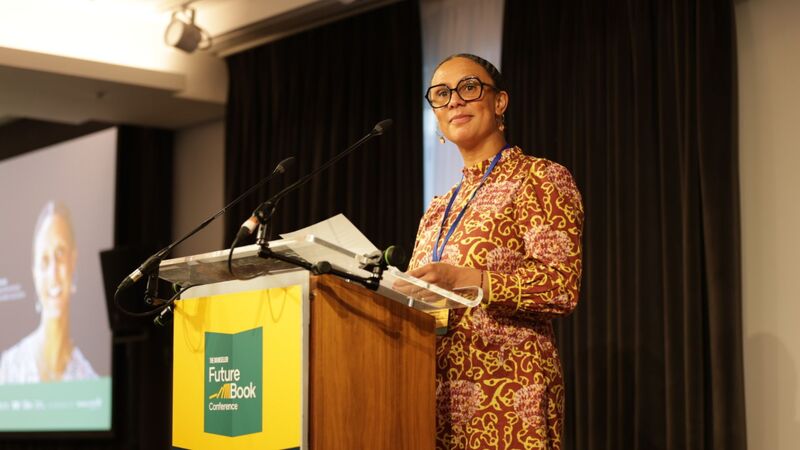You are viewing your 1 free article this month. Login to read more articles.
BA urges trade to examine impact of publishing to curb climate change
Publishing has made strides in becoming more sustainable, but firms need to collaborate for a more radical overhaul, both the Booksellers Association and Extinction Rebellion have separately claimed this week.
Alongside talking up the BA’s own green manifesto and praising the trade’s initiatives, BA president Nic Bottomley made a call to action during his speech at the association’s conference in Birmingham. He told the audience it was time for “big collaborative conversations”, adding: “We may be great at recycling our waste material, but let’s have a think about how many books we’re destroying as an industry. And how much fuel we’re burning, shipping too many books into our shops in the first place just so we can ship back the ones we don’t sell to be efficiently recycled.”
In an unlikely echo, Extinction Rebellion co-founder Clare Farrell told The Bookseller that publishing needs to hold an urgent conversation on what it can do to combat catastrophic climate change. Farrell, a speaker at the upcoming IPG autumn conference, likened the situation to a war, but said it was up to individuals, not their leaders, to react. She said: “Industries need to talk to themselves about what they’re going to do. The government isn’t going to step in and legislate. It’s about saying to people, ‘What are you going to do about it?’, because if we carry on like this, the prognosis is extremely bad.”
Farrell suggested publishing, like other industries, needed to look at its “ancient” processes and come up with new ones. That could be anything from producing fewer books to taking the train rather than a plane to Frankfurt. “The interesting question for us is how much stuff should get printed at a time like now, when we need to stop cutting down trees. That’s not just books, that’s everything. We need to be asking how we should be using our resources.”
Farrell said she had “difficult conversations” with PRH when it rush-published Extinction Rebellion’s book This Is Not a Drill earlier in the year, including around its use of recycled paper and whether it should list the carbon footprint of ingredients in their cookbooks. PRH may not be following all of the group’s advice, but it is taking steps of its own to confront the challenge. Distribution has been a major focus, with work under way to slash the use of plastics after a review of its warehouse systems. Results showed the heaviest use of single-use plastic was in the shrinkwrap around book pallets and the inlay inside cardboard boxes that protects books during transit.
In response, the company bought multi-use pallet lids which remove the need for shrink-wrap at all. Working with printer Clays, by the end of the year 90% of the palleted stock delivered to its warehouses should use them. The plastic inlay has also been ditched in the 3,200 cardboard cartons sent out every day to customers, replaced with shredded cardboard from boxes received from printers.
“Over the past year we’ve been investing and innovating in our supply chain with a particular focus on sustainability—to make the way we do business on a day-to-day basis as green as possible,” Colin James, m.d. for distribution at PRH, explained. “As the link between our publishing teams, our customers and our distribution centres is at the very heart of our publishing operations, we want to set a gold standard for our company and our industry. After a thorough internal review in 2018, we have cut single-use plastic within our warehouses by 47%—the equivalent of 37.6 tons—by reducing a significant amount of the plastic used to transport our books from our suppliers and to our customers.”
Focus on distribution
Distribution has also been a major plank in Hachette UK’s sustainability strategy. The company’s new mega-warehouse, the Hely Hutchinson Centre in Didcot, has the same focus on cutting waste, using returnable totes for deliveries to key customers. There are constant reviews to minimise plastic, including recyclable shrink film, cartons cut to size and the use of paper over plastic to fill voids in transit cases, while any suitable void fill received from other sources is reused. By moving the firm’s activities to one distribution centre, it has cut transportation costs by 10%.
Its environmental working group PAW is also embarking on a major project—in line with recommendations from sustainability group Book Chain Project and in tandem with the PA and BA—that will interrogate every aspect of the way Hachette designs, prints and distributes books “to become a benchmark in best practice and a trailblazer for sustainable publishing”. Like many, it has also turned to FSC paper, endorsed by the WWF, among others, as a sustainable source. In 2018, 91.5% of Hachette’s total UK output was printed on FSC paper. PRH and HarperCollins have hit 99%, with plans to make that 100% by 2020.
For many in the industry, lots of smaller changes are being made, particularly in their own office, which could potentially add up to a larger impact. Every company contacted by The Bookseller for this article had made changes whether it was Pan Macmillan changing its printing paper and banning plastic cutlery, Clays’ biodegradable shrinkwrap, Profile joining this month’s Climate Strike, or Gardners’ direct from printer deliveries. Like other publishers, HarperCollins has made changes in its buildings, partly due to a roster of “Green Champions” who suggest initiatives. Over the past couple of years its London offices have removed plastic in its catering in favour of alternatives using metal, paper and bio-degradable corn starch; it also recycles all food waste—some through the charity Fair Share, which provides meals for the homeless—donates old furniture locally, and has installed IT waste bins for old office and personal tech on every floor.
At Stanfords, many employees cycle to work and around 80% of waste is recycled. The bookshop has also switched to using biodegradable cups in its London cafe and is offering print on demand options to reduce unnecessary waste."
Stanfords c.e.o. Vivian Godfrey said: "Stanfords is committed to sustainable initiatives wherever possible. We try to reuse wherever possible too - we save many of the boxes that arrive from publishers to be reused for either posting customer web orders or sending returns back to publishers. This year we will offer Print on Demand options for materials for our Edward Stanford Travel Writing Awards (ESTWA) in order to reduce unnecessary waste. In prior years materials have been printed and distributed to retailers and libraries to publicise the short listed and winning titles. In our café we have recently switched to using biodegradable cups - we researched compostable versus biodegradable cups and quickly reached the conclusion that in central London it is not sensible to choose compostable cups since so few customers will be able to dispose of them properly. We are currently exploring how we can compost waste."
At Simon & Schuster, commercial director Russell Evans is part of a green committee that has seen a raft of changes, including biodegradable shrinkwrap, stationery made from recycled materials, deliveries in electric vans and a move to LED lighting. A new trial will see advance copies sent out in tote boxes, ditching the plastic and cardboard of the past.
Evans said huge challenges remained in distribution, but he added: “I want to start measuring metrics and make sure we conform to standards as much as possible. It’s so important because we publish on environmental subject matters and, if you think about the amount of paper the industry uses, we need to put something back.”
S&S is also partnering with 20 Waterstones stores to trial the use of a new compostable carrier bag made from 100% renewable and sustainable corn starch. More widely, the bookselling chain is replacing plastic bags with ethically sourced paper ones and moving 85 of its stores to LED lighting, while its Hub no longer uses shrinkwrap internally.
Other chains taking action include The Works, which has launched its ReWorked scheme to cut waste, with initiatives including removal of finishes such as glitter and plastic, the use of FSC paper and the reduction of physical packaging. Blackwell’s sales and marketing director Phil Henderson said green issues were “close to our hearts”, and it had moved to low-energy lighting and bio-degradable carrier bags—which were now no longer proactively offered to customers. “We are very supportive of the BA’s Green Manifesto and look forward to delivering more in this area in the future,” he said.
Manifesto for change
That manifesto calls on publishers and distributors to take up commitments including phasing out single-use cardboard in favour of recyclable materials, reviewing delivery and returns, and to stop sending out unsolicited book proofs and marketing materials to booksellers. The BA is also convening a Green Trade Summit early next year to brainstorm around the issues.
M.d. Meryl Halls said: “Booksellers are right at one end of the supply chain and have a responsibility to adopt their own green activities, as well as to influence trade partners all the way up the supply chain. We are really proud of the energy and activism in some bookshops around environmentalism—and are very aware too of the wider, bigger impacts of book publishing, production and selling on the planet’s resources.
“Our manifesto is a mixture of practical, political and aspirational items, and includes ways in which the BA itself will improve, including a green audit, as well as simple steps like changing energy suppliers and simple everyday behaviours with recycling and waste. There’s an appetite to improve the situation, and a zeal to do the right thing, even if it means taking a close, hard look at some of the systemic problems across the trade. It’s a big, global, generational challenge, but booksellers are up for it.”
Read about what The Bookseller is doing to become more environmentally friendly here.



















